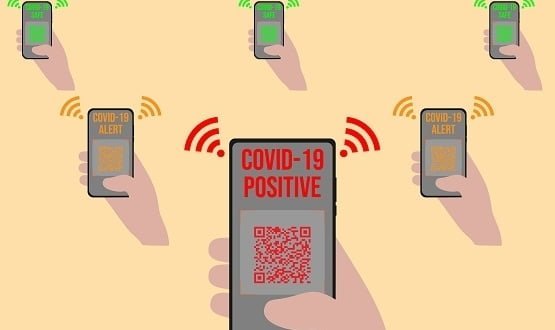Data from NHS contact-tracing app ‘to be kept for research purposes’
- 7 May 2020

A portion of data collected by the NHS contact-tracing app will be kept for research purposes when the Covid-19 pandemic is over, NHSX has confirmed.
Concerns about privacy and the use of data have been rampant since it was announced central NHS would be tracing the virus through the app alongside traditional contact-tracing methods.
Front and centre were concerns the app would eventually be used for mass surveillance and a lack of clarity around how data would be used.
NHSX has always maintain that data collected by the app would be deleted if a user chose to remove the app, but a spokesperson has now confirmed some will be retained for research purposes.
“We will publish the data protection agreements in due course, and we will close down the app once the threat from the pandemic has passed, with any data users have chosen to share deleted at that point and some retained for research purposes, to better understand the virus,” they said.
“Privacy and security has been paramount throughout the app’s development and the National Cyber Security Centre has been involved in this.
“Users of the app will remain anonymous up to the point where they volunteer their own details, and there will be no database that allows the de-anonymisation of users.”
The app, which was launched on the Isle of Wight this week, uses Bluetooth to trace users movements. When it comes into contact with another device it generate a anonymised identifier, which is stored on the app until a user opts to send that data to a central NHS database.
It doesn’t require a person’s name, age, address or any other personal details, only the first half of their postcode, NHSX said.
But privacy group medConfidential warned it’s impossible to reassure users about privacy when the app is in such early stages.
“The government touting the success of the app before they have decided what it will do is causing widespread concern. It is impossible to reassure people about decisions that have not yet been made, especially when there is so much basic information missing,” coordinator Sam Smith told Digital Health News.
“Anyone in a full research study will be fully and explicitly consented into that research study; without that there will be no basis for ethical research to attempt any such matching.
“This data shouldn’t be treated significantly differently to other NHS data made available to researchers.”
[themify_box icon=”info” color=”gray”]
More on Covid-19 contact tracing apps
- NHSX sets up ethics advisory board to oversea contact-tracing app
- Contact-tracing apps could ‘catastrophically’ hamper trust, academics warn
- Imperial white paper outlines key data questions for contact-tracing tech
- ‘Absence of evidence’ for Covid-19 contact-tracing apps, review finds
- NHSX must be ‘upfront’ about contact-tracing app, privacy group says
- NHSX differs with Apple and Google over contact-tracing app
[/themify_box]
NHSX chief Matthew Gould has repeatedly said its ‘centralised’ model allows for better tracing of the virus and how it is spreading, despite widespread concerns about privacy compared to a ‘decentralised’ approach favoured by Apple and Google.
Speaking at the Science and Technology Committee on 28 April Gould said the model offered “profound benefits” including the ability to detect “malicious use”.
NHSX has differed from Apple and Google in its approach to contact-tracing, sparking concerns about the apps privacy and interoperability with iOS and Android.
Apple and Google in April announced they would be developing contact-tracing technology that would be interoperable with iOS and Android, with many countries opting for their approach.
Gould has assured NHSX is working closely with Apple and Google, including discussions about the APIs the organisation has used.
Digital Health Unplugged’s latest podcast looks at privacy, data and accountability in the NHS, with particular focus on the NHS contact-tracing app. Hear from DAC Beachcroft lawyers as well as Phil Booth of medConfidential here, or you can follow us on Spotify, Apple Podcasts or iTunes.




